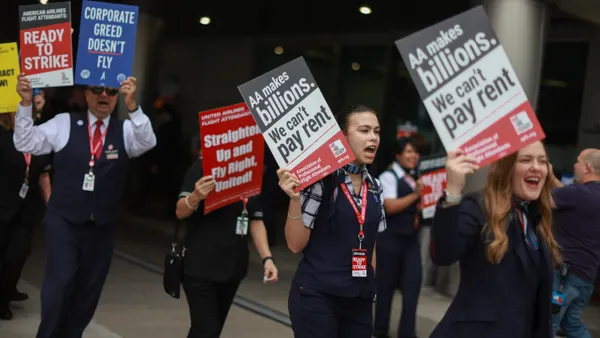Dive Brief:
-
More than 76% of employees in a recent survey said they're confident their managers were properly trained on how to identify employees who may be having a mental health issue, while only 16% of HR professionals surveyed agreed. In fact, almost all employees assumed managers were trained on how to refer employees to mental health resources, but just 25% of HR pros said their managers are provided that training, the Unum survey revealed.
-
The survey also found that a majority of workers with mental health issues believe there is a stigma toward mental illness in their workplaces. And half of these workers believe that prejudice has worsened or stayed the same over the last five years, Unum said.
-
Additionally, 55% of employees said their employer didn't have (or they weren't sure if their employer had) a specific mental health policy or program in place. The survey solicited responses from 1,850 workers, including 268 HR professionals and 500 employed adults diagnosed with mental health issues.
Dive Insight:
Mental illness is pervasive in the U.S., according to the Centers for Disease Control and Prevention (CDC). For younger generations especially, major disorders can co-exist with burnout, a more generalized feeling of anxiety, stress and exhaustion that is prominent in overworked labor forces. Burned out workers can be less productive and less engaged — and their work stress can often catalyze job searches.
Stressors at work exacerbate conditions for some workers, Unum’s findings confirm, so it may be incumbent on employers to help workers cope as mental health problems come and go. While flexible policies, such as work-from-home days, paid time off and even reduced hours, may alleviate the symptoms of employee burnout, the CDC suggests offering employee assistance programs (EAPs) and educating managers to spot signs of depression, too. HR also can train managers to assess when employee conditions might qualify as disabilities under the Americans with Disabilities Act and necessitate workplace accommodations.
Even with lifelines in place, HR must still think about work culture. If workers feel stigmatized at work for having mental health issues, as did Unum’s respondents, then they may not feel comfortable using an EAP or talking to HR. Being vocal and enthusiastic about the organization’s mental health resources could encourage workers to try them without shame or fear. And checking in with all employees — not just those with mental health issues — also may help HR gauge programs' efficacy and prevent disengagement.












